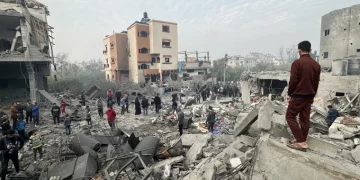New Delhi: COP28 President Sultan Al Jaber Thursday said there are strong views on fossil fuels at this year’s UN climate talks and added that nothing is off the table.
Addressing the COP28’s opening plenary session, Al Jaber — who officially took charge as COP28 president from Egypt’s Sameh Shoukry — said, “This COP is about improving lives, it’s about people.”
There is a mounting global push for a phaseout of fossil fuels — coal, oil, and gas — which are the largest contributors to global climate change, accounting for more than 75 per cent of global greenhouse gas emissions and nearly 90 per cent of all carbon dioxide emissions.
There has been resistance from fossil fuel-producing nations and companies that argue that they should be allowed to keep extracting oil and gas as long as they capture carbon emissions using sophisticated technologies, which experts say are “expensive and unproven”.
Findings from “The 2023 Production Gap Report” reveal that governments still plan to produce more than double the amount of fossil fuels than is consistent with limiting global warming to 1.5 degrees Celsius, the guardrail to avoid the worsening of climate impacts.
The “Emissions Gap Report 2023”, released November 20, warns that the world is heading for a nearly 3-degree-Celsius of warming if governments do not agree to and implement more ambitious targets.
In Glasgow in 2021, COP26 called on countries to “phase down” unabated coal power. Taking this forward, around 80 developed and developing countries supported India’s call to phase out all fossil fuels, not just coal, at last year’s COP27.
The momentum behind the call to phase out all fossil fuels has only grown since COP27 and COP28 presents an opportunity for governments to correct course.
However, phasing out or phasing down fossil fuels is easier said than done as countries in the Global South heavily rely on coal and oil and do not have enough means to shift to cleaner fuels or renewables.
“I know there are strong views about the idea of including language on fossil fuels and renewables in the negotiated text. We have the power to do something unprecedented. I ask you to work together,” Al Jaber urged delegates.
“Let’s maximise momentum on mitigation. No issue is left off the table, including the role of fossil fuels,” said the COP28 president, who leads the state-run Abu Dhabi National Oil Company.
Al Jaber called for proactive engagement with oil and gas companies and emphasised the importance of decarbonising the existing energy system.
“Let’s work together, finding common ground and achieving consensus,” he urged.
The COP28 president also underscored the commitment to unlock finance to ensure that the Global South doesn’t have to compromise between development and climate action. “Our task is not just about negotiating text; it is about making a tangible difference in the world,” he said.
Addressing critical issues, he urged the parties to bridge the global adaptation finance gap and ensure operationalisation of the Loss and Damage fund.
“COP28 is committed to prioritising nature, lives, and livelihoods in national plans,” he stressed, announcing the hosting of a climate health ministerial.
UN Climate Change Executive Secretary Simon Stiell in his opening remarks recounted watching his son as a baby, crawling across the grasses of his parents’ island home.
He said, “We are taking baby steps … We must teach climate action to run. Because this has been the hottest year ever for humanity. So many terrifying records were broken. We are paying with people’s lives and livelihoods.”
“If we do not signal the terminal decline of the fossil fuel era as we know it, we welcome our own terminal decline. And we choose to pay with people’s lives,” he added.
At the COP27 in Egypt’s Sharm El-Sheikh last year, rich countries agreed to establish a loss-and-damage fund to compensate developing and poor countries that bear the brunt of the climate crisis despite contributing little to it.
Stiell said, “If this transition isn’t just, we won’t transition at all. That means justice within and between countries. Sharing benefits across society.”
The UN climate talks opened with a bang with an agreement being clinched on the operationalisation of the Loss And Damage Fund.
A draft agreement on the fund was arrived at earlier this month and a revised agreement released a day ago.
The draft agreement had asked the developed countries to contribute to the fund but said other countries and private parties can also make contributions. Allocations will prioritise those most vulnerable to climate change but any climate-affected community or country is eligible.
The climate talks will continue until December 12 and is anticipated to involve intense negotiations on compensation from rich countries to developing ones for climate impacts, fossil fuel usage, methane emissions, and financial aid for reducing planet-warming emissions and adapting to climate change.
PTI







































